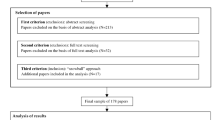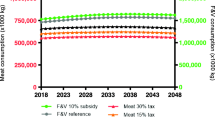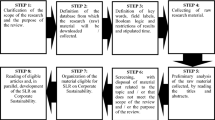Abstract
Purpose
Small and medium enterprises (SMEs) account for 99 % of companies operating in the European food and drink industry and, often, are part of highly fragmented and complex food chains. The article focuses on the development of a social impact assessment methodology for SMEs in selected food and drink products as part of the EU-FP7 SENSE research project. The proposed methodology employs a top-down and bottom-up approach and focuses on labour rights/working conditions along the product supply chain as the key social impact indicator, limiting key stakeholder classification to workers/employees and local communities impacted by the production process. Problems related to this emerging field are discussed, and questions for further research are expounded.
Methods
The article reviews both academic and ‘grey’ literature on life cycle assessment (LCA) and its relationship to social LCA (S-LCA) and SMEs at the beginning of 2013 and includes case study evidence from the food sector. A pilot questionnaire survey sent to European food and drink sector SMEs and trade associations (as partners in the research project) about their knowledge, experience and engagement with social impacts is presented. Proposals are elaborated for a social impact assessment methodology that identifies the key data for SMEs to collect.
Results and discussion
The literature reveals the complexity of the S-LCA approach as it aims to unite disparate and often conflicting interests. Findings from the pilot questionnaire are discussed. Using a top-down and bottom-up approach, the proposed methodology assesses data from SMEs along the supply chain in order to gauge social improvements in the management of labour-related issues for different product sectors. Issues relating to the ‘attributional’ choice of a social impact indicator and key stakeholder categories are discussed. How ‘scoring’ is interpreted and reported and what the intended effect of its use will be are also elaborated upon.
Conclusions
Whilst recognising the difficulty of devising a robust social impact assessment for SMEs in the food and drink sector, it is argued that the proposed methodology makes a useful contribution in this fast-emerging field.
Similar content being viewed by others
Notes
SENSE (http://www.senseproject.eu/, accessed 8 November 2013) focuses on European SMEs and aims to deliver a harmonised system for the environmental impact assessment of food and drink products—to be presented as a self-administered data entry software tool. In order to identify what categories of data are to be used, the project is evaluating existing relevant environmental impact assessment methodologies to identify key environmental performance indicators (KEPIs) and is also considering social and socio-economic impacts.
Information on ILO core labour standards can be found at http://www.ilo.org/global/standards/introduction-to-international-labour-standards/conventions-and-recommendations/lang--en/index.htm (accessed 8 November 2013).
Full details of the ETI base code can be found at http://www.ethicaltrade.org/resources/key-eti-resources/eti-base-code (accessed 8 November 2013).
Full details of the SGF/IRMA CoC can be found at http://www.sgf.org/en/home/fks/nachhaltige-produkte/ (accessed 8 November 2013).
References
Aquaculture Stewardship Council (2012) ASC farm certification and accreditation requirements. Version 1.0. Utrecht
Barrientos S, Gereffi G, Rossi A (2008) What are the challenges and opportunities for economic and social upgrading? Concept note ‘Capturing the gains’ workshop. University of Manchester
Benoît C, Mazijn B (eds) (2009) Guidelines for social life cycle assessment of products. UNEP/SETAC Life Cycle Initiative, Paris
Benoît-Norris C, Vickery-Niederman G, Valdivia S et al (2011) Introducing the UNEP/SETAC methodological sheets for subcategories of social LCA. Int J Life Cycle Assess 16:682–690
De Camillis C, Blighy JC, Pennington D, Palyi B (2012) Outcomes of the second workshop of the Food Sustainable Consumption and Production Round Table Working Group 1: deriving scientifically sound rules for a sector-specific environmental assessment methodology. Int J Life Cycle Assess 17:511–515
Dreyer L, Hauschild M, Schierbeck J (2006) A framework for social life cycle impact assessment. Int J Life Cycle Assess 11(2):88–97
Fox T, Vorley B (2004) Corporate accountability in the UK supermarket sector. Final report of the race to the top project. International Institute for Environment and Development, London
Freidberg S (2009) Hotspots in a cold chain: a life-cycle assessment of Loki fish. Environmental studies paper, Dartmouth College http://www.lokifish.com/freidbergpaper.pdf. Accessed 5 Sep 2013
Griesshammer R, Benoît C, Dreyer LC et al. (2006) Feasibility study: integration of social aspects into LCA. https://biblio.ugent.be/input/download?func=downloadFile&recordOId=512499&fileOId=633083. Accessed 28 Oct 2013
Henriques A (2012) Standards for change? ISO 26000 and sustainable development. IIED, London
Jørgensen A (2010) Developing the social life cycle assessment: addressing issues of validity and usability. Dissertation, DTU Management Engineering
Jørgensen A (2012) Social LCA—a way ahead? Int J Life Cycle Assess 18:296–299
Jørgensen A, Dreyer LC, Wangel A (2012) Addressing the effect of social life cycle assessments. Int J Life Cycle Assess 17:828–839
Kissinger G (2012) Corporate social responsibility and supply agreements in the agricultural sector: Decreasing land and climate pressures. CCAFS working paper no. 14. CGIAR Research Program on Climate Change, Agriculture and Food Security (CCAFS), Copenhagen
Klopffer W (2003) Life-cycle based methods for sustainable product development. Int J Life Cycle Assess 8:157–159
Kruse SA, Flysjo A, Kasperczyk N, Scholz AJ (2009) Socioeconomic indicators as a complement to life cycle assessment—an application to salmon production systems. Int J Life Cycle Assess 14:8–18
Macombe C, Feschet P, Garrabe M, Loeillet D (2011) 2nd International seminar in social life cycle assessment—recent developments in assessing the social impacts of product life cycles. Int J Life Cycle Assess 16:940–943
OECD (2009) Overview of selected initiatives and instruments relevant to corporate social responsibility. Annual report on the OECD guidelines for multinational enterprises 2008. OECD, Paris
Parent J, Cucuzzella C, Reveret J (2013) Revisiting the role of LCA and SLCA in the transition towards sustainable production and consumption. Int J Life Cycle Assess 18(9):1642–1652
Reitinger C, Dumke M, Barosevic M, Hillerbrand R (2011) A conceptual framework of impact assessment within SLCA. Int J Life Cycle Assess 16:380–388
Steering Committee of the Salmon Aquaculture Dialogue (2012) Final standards for responsible salmon aquaculture, June 2012. http://assets.worldwildlife.org/publications/433/files/original/SAD_Standard_Final_Draft.pdf?1346188051. Accessed 7 Nov 2013
Valdivia S, Ugaya C, Sonnemann G, Hildenbrand J (2011) Towards a life cycle sustainability assessment. Making informed choices on products. UNEP/SETAC, Paris
Acknowledgments
This research was undertaken with support from the EU Seventh Research Framework collaborative research project under the KBBE theme, grant no: 288974, entitled ‘SENSE: HarmoniSed ENvironmental Sustainability in the European food & drink chain’.
Author information
Authors and Affiliations
Corresponding author
Additional information
Responsible editor: Niels Jungbluth
Rights and permissions
About this article
Cite this article
Smith, J., Barling, D. Social impacts and life cycle assessment: proposals for methodological development for SMEs in the European food and drink sector. Int J Life Cycle Assess 19, 944–949 (2014). https://doi.org/10.1007/s11367-013-0691-0
Received:
Accepted:
Published:
Issue Date:
DOI: https://doi.org/10.1007/s11367-013-0691-0




